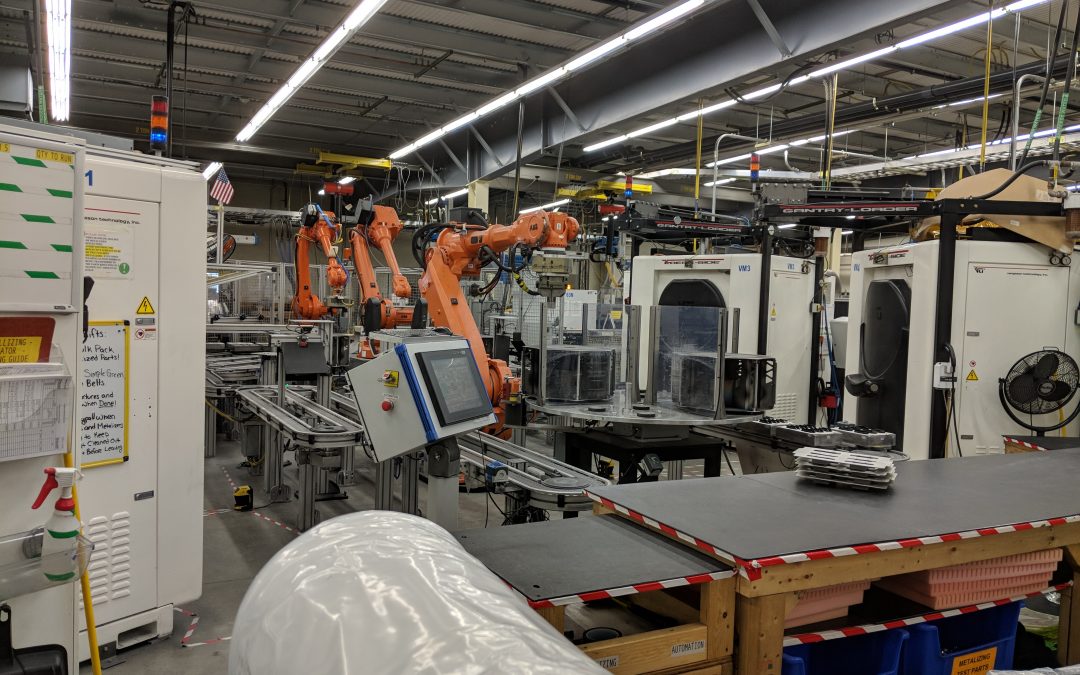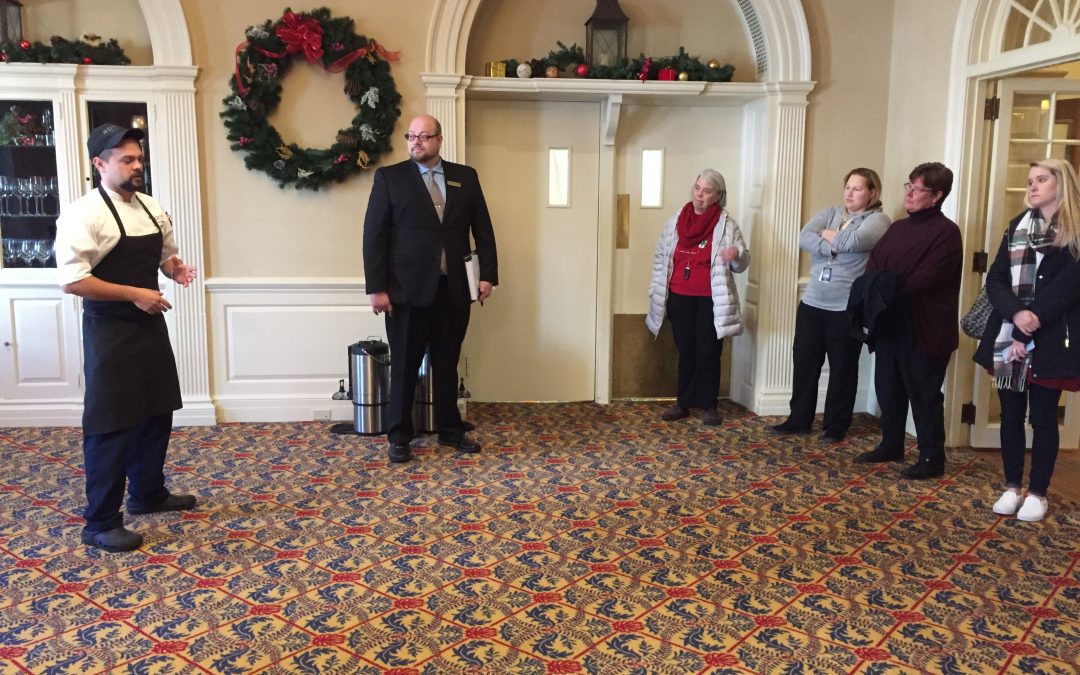
Feb 28, 2018 | Article
Among several related objectives, one of the most important for the NH Association of Career and Technical Administrators (NHCTA) is to form meaningful partnerships with industry. One such partnership is with the Whelen Engineering Company, Inc, which will host a meeting on March 9 at its manufacturing facility in Charlestown, NH with CTE directors and principals from schools across the state.
According to Whelen Engineering’s Jerry Maslan, who noted their company’s leadership and management will also be present, the purpose of the meeting is three-fold.
“We can discuss what is currently working, what can be improved on, and how we can adjust the curriculum to better meet the needs of manufacturing,” he said.
According to Maslan, the need to continue to leverage—and build upon—current relationships with CTE centers, each of which is charged to prepare high school students for careers—has never been greater.
“As the industry becomes automated, there doesn’t seem to be enough people or students coming up prepared or willing to run the machines,” he said.
The question as to how they increase the technical pool of available students is as much practical as it is rhetorical, which Maslan attributes to several possible causes.
“It may be a lack of understanding of the current manufacturing world,” he explained. “It could be a stereotype where manufacturing facilities are seen as ‘old dirty machine shops,’ which is not true at all.”
He said what is true is that modern day manufacturing facilities are “state of the art and clean,” which he noted Whelen Engineering makes clear during periodic tours they host for students, teachers and administrators.
“A lot of the feedback we get from students is that this place is not what they thought it would be,” he said.
Headquartered in Chester, CT, but employing 1,000+ in Charelestown, Whelen Engineering expects the future in manufacturing to be as bright, if not brighter, than the present. Given this bright future, Maslan said it is critical they continue to work with CTE centers, administrators and various related agencies.
“It’s important to have these relationships so students, teachers and administrators can get a true understanding of current manufacturing needs,” he said. “We need to focus on the STEM education systems in schools so we can better prepare students for what lies ahead and get them excited for the opportunities that are there for them today and tomorrow.”
As for the agenda at this meeting, Maslan said they plan to cover a variety of topics that may be broken down into different areas:
From a general career pathways standpoint
- What does Whelen Engineering value in staff?
- What does Whelen Engineering value in skills including degrees and certificates?
- What background does Whelen Engineering seek for employees?
- How does Whelen Engineering support employees going on with their education while
- employed? What are current employees doing?
- What career tracks are available at Whelen Engineering? For example, from machine
- operator to programmer to product engineer? In addition, what kind of support careers
- and jobs are available (accounting, culinary…)?
From an employment standpoint?
- Who makes it at Whelen Engineering? Who does not?
- How does someone gain employment there? What is the process?
- How does the outside workforce align to Whelen Engineering’s needs?
- How do you recruit? What works? What does not?
- What does the future look like with regard to growth and possible needs?
- How does hiring from within work? What are career tracks at Whelen Engineering?
Math and Science at Whelen Engineering
- What examples of skills are worth hearing?
- What particular math and science skills are of interest? What needs emphasis?
General K-12 Education
- How can we better prepare students?
- What are we missing?
- What are we doing well? What is getting better?
- What message does Whelen Engineering want to send to public schools including school counselors? admin? teachers? parents? Kids? CTE?
- Cultural: Where do parents fit in to understanding advanced manufacturing?
How does Whelen Engineering educate their incoming and current workforce?
- Example: Knowledge of math – trig vs. calculus; reading, writing
- Retraining and refocusing?
- What does it look like? What does a training day like?
- Who is eligible – what skills are tested beforehand?
According to Maslan, various department managers will also be present at the meeting, which underscores Whelen Engineering’s belief in its fundamental importance.
“Having the people who run these departments at the meeting is very important,” he said. “They know current needs and can work with the CTE directors and principals to adapt their education systems to meet industry needs…It’s about getting the right people in the right room at the right time…we are all committed.”
To learn more about Whelen Engineering, visit www.whelen.com.

Feb 26, 2018 | Article, Automotive
Concord Regional Technical Center Automotive Technology teacher Scott Mayotte has been recognized as one of the top skilled trades teachers in the country in the annual Harbor Freight Tools for Schools national competition. His $30,000 prize is a split award, with $10,000 going to Mr. Mayotte and $20,000 going to his automotive program at the CRTC.
The purpose of the prize is to recognize teaching excellence in the skilled trades that enables students to “learn deeply and be career-ready,” Harbor Freight Tools said in a statement announcing the $500,000 national competition. “We define an ‘excellent’ program as one led by a teacher who clearly loves the subject matter and … whose curriculum is matched to a relevant career pathway and future work choices.”
Mr. Mayotte, who lives in Lebanon, ME, was one of ten finalists from across the country representing skilled trades such as construction, automotive, architecture, manufacturing and marine systems technology. There were three $100,000 first-place winners announced late last year and seven second-place winners who were awarded $30,000, with awards being split between the teachers and the programs they teach.
“We are all very proud of Mr. Mayotte, and very happy with the recognition this award brings to the career pathway work we do here at the CRTC,” CRTC Director Steve Rothenberg said. “This award not only validates the investment Mr. Mayotte makes in his students and his program but also helps to create an awareness of the way high school career and technical education programs statewide promote college and career readiness.”
After nearly two decades as an automotive technician for Volkswagen, Mr. Mayotte returned to the classroom to teach Automotive Technology at the CRTC in 2011. His students graduate from a nationally certified program with valuable industry credentials and can earn college credit for their coursework. By cultivating relationships with 14 New Hampshire auto dealerships, Mr. Mayotte is able to both keep his program current with industry technology and place all his senior year students into internship positions where they are able to refine their skills and develop the beginnings of a professional network.
This fall, Mayotte established the “All Girls Garage” at Concord High School to introduce more young women to the auto industry, and he works with each of his students to develop a workable college and career plan so that they leave high school knowing both where they want to go and just how to get there.
“My goal is to provide each student with the tools and support he or she needs to leave high school with a workable plan for future success,” Mr. Mayotte said.

Feb 22, 2018 | Article
On Friday, April 13, the Vermont/New Hampshire Career Development Association (VTNHCDA)will host its first ever all-day workshop at Keen State College.
According to Doug Cullen, past president of the association, the gathering will be “a small event, but with great speakers,” each of whom will initiate conversations around Transition Planning for students and young adults in Vermont and New Hampshire.”
“Participants will hear from both local and national speakers about how others are looking at the career development frameworks and putting them into operational practices,” he said.
He said the workshop will also provide educators from New Hampshire an opportunity to learn more about what is happening just west of the state’s border.
“How much do N.H. practitioners know about what Vermont is doing?” he rhetorically noted. “Do New Hampshire practitioners even know about Vermont’s Act 77 and other related legislation that put career pathways into a very positive light? It will be especially good for us in New Hampshire to hear from and work with people from another state, which has been a fundamental aspect of the Vermont/New Hampshire Career Development Association since its inception in 2016.”
At the workshop, scheduled speakers will include:
- Julie Heinz, Senior Advisor at Michelle Obama’s Reach Higher Initiative at Civic Nation, will speak about her work and Transitions
- James Westhoff, NCDA Credentialing
- Ed Colozzi, Career Development and Counseling Services & President of the the Massachusetts CDA – Transitions
- Drew McDowell, Director of Adult Education/Assistant Director at Windham Regional Career Center – Workforce technologies and expanding the post-Secondary landscape
“The focus of the event with invites sent out throughout New Hampshire and Vermont is to get educators with a stake in developing career development competencies in their school and district engaged in best-practice conversations,” said Cullen. “It all complements the contemporary effort of developing robust career pathways across the region and across the ‘great divide,’ which is high school graduation.”
Noting one of the other central themes of the workshop relates to asking and answering, “How much are we operating with educators ‘across-the-border’ in ways that are earnestly considered collaborative?” Cullen cited other important concepts.
“We also want participants to hear a bit from Washington and the Reach Higher initiative, as it relates to understanding metrics being used throughout the U.S. that measure college ‘engagement’ and ‘retention’ rates,’” he said. “These are tactical measures that can translate into big-picture economic development gains if the efforts behind the metrics have follow-through and support.”
To register for the workshop, which includes breakfast and lunch, click or to register, visit https://docs.google.com/forms/d/e/1FAIpQLSftW8V69tUPX4bj_CWKAcNwP2F41F8io4FkXur5bfD8EvAUog/viewform.
To learn more about the VTNHCDA, visit https://vtnhcda.org.

Jan 24, 2018 | Article
Traditional educational approaches often focus on theory as opposed to practical application, which does not define STEM CTE programs, according to Frank Xydias, engineering instructor at Milford High School & Applied Technology Center in Milford.
“Many of the problems we solve in STEM classes are open-ended and grounded in solving real-world problems,” he said.
Such real-world problems often involve the needs of real people, which was precisely the case with Morgan Peterson, a 11-year-old middle school student, who last year presented Xydias and his students with a unique opportunity.
“I met Morgan’s mom at one of our STEAM nights, and she told me about her daughter’s issues with riding a bike,” he said. “Morgan has a prosthetic arm and her bike adaptor made riding her bike in comfort just about impossible.”
In approaching Xydias about the possibility his students could solve her daughter’s problem, Meg Peterson, who works in the district as a Title 1 Coordinator at the elementary level, said she was excited at the prospect.
“My husband and I had talked about it, and I began to wonder if Frank and the kids could work on building her an adaptor for her bike,” she said. “He floated the idea to the students and they were very enthusiastic about it.”
No one, however, was more enthusiastic than Morgan herself provided Xydias and the students satisfied her one condition.
“My first reaction was that I wanted to work with them,” she said.
She did work with them, according to her mom, who said it was “pretty amazing” to see her daughter work and interact with high school students.
“It was great to see her just walking around with those high school students—it was like a think tank thing,” she said.
According to Meg, the students and her daughter designed solutions that were consequently printed via a 3D printer. Noting the team produced several iterations up the adaptor before the final version, Meg said the entire process was “incredible” and serves to bolster her belief in the power of STEM and STEAM in general.
“Those STEAM events bring out the most diverse amount of students—and it’s not just robotics or certain kind of students,” she said. STEAM is for everyone…It’s great to see kids finding their niche early, solving problems and stretching themselves in new and different ways. It’s wonderful to see kids find their passion in this area.”
Citing her own interest in pursuing CTE in either manufacturing or the culinary arts when she is in high school, Morgan said the best thing about her collaboration with Xydias’ team is that she loves to ride her bike.
“It works great,” she said. “I can ride it as long as I want—it never hurt my shoulder.”
As for what advice she might give other students her age who might be thinking about their respective futures, Morgan said CTE taught her something very important.
“It doesn’t matter who you are or what you do, you can always find a way to solve the problem,” she said.

Jan 17, 2018 | Article
One of the biggest challenges facing employers today is how to connect with today’s students to create a working employment pipeline. This challenge may have been ameliorated recently with a U.S. Department of Labor Wage and Hour Division ruling on January 5, which provides less stringent guidelines regarding internships.
According to Doug Cullen of Pinkerton Academy, the most notable change is the elimination of the statement, “The employer that provides the training derives no immediate advantage from the activities of the intern.”
“That statement has historically been a big hurdle for many employers apprehensive to bring on unpaid interns,” he said. “It’s a big win for employers across New Hampshire and the nation.”
While noting that employer-provided work experiences need to maintain their educational focus, Cullen noted that the current mandates should provide employers with many new opportunities.
“I think they are going to be able to look at schools with a much more creative eye and much less fear of crossing into illegal territory,” he said.
To learn more about the ruling and internship programs under current law, visit https://www.dol.gov/whd/regs/compliance/whdfs71.pdf.
Other recent developments in the state include a new website by the NH Manufacturing Extension Partnership (NH MEP), which was designed to help streamline the process by which students connect-to-industry. The rationale for the site is as follows:
“NH MEP has always been committed to helping build the future manufacturing workforce in New Hampshire. But we know high school, middle school and community college students in New Hampshire, who are looking for a career in or learning about manufacturing, are finding it difficult to find those jobs and internships. This has led NH MEP to create a new web portal to help you and your students search for manufacturing jobs and internships. The portal can also help you schedule a visit with a New Hampshire manufacturer.”
On the site, students can search for jobs and internships from qualified New Hampshire manufacturers. For more information, visit www.nhmepworksource.com.

Jan 4, 2018 | Article
In early December, dozens of school counselors, school board members and administrators attended an Informational Industry Tour at the Seacoast School of Technology (SST) in Exeter. At this event, the focus was on the Restaurant, Hotel and Hospitality Industry, according to Equity Counselor Sharon Spooner.
“Our aim for providing this tour was for school counselors, administrators and anyone working with students to have a better understanding of all the possible career opportunities that exist in this fields,” she said.
Last month, SST provided a bus for counselors and school board members to take a tour of the Automobile Industry.
“We toured two different local dealerships and were introduced to the many different career opportunities that exist in that industry,” she said. “It’s not just the sales people or the technicians, but also in the areas of service, diagnosis, parts, computer technicians and so on–these are all well paying jobs that they need people to fill.”
At The Exeter Inn and Epoch Restaurant & Bar, which is where December’s tour was held, General Manager Thomas DeSisto spoke about the qualities they look for in employees as well as his own story and how his experiences early in life helped shape him.
“Having a chance to educate counselors and others about what we do and the scope of available career paths from entry level to senior management is very exciting,” he said.
Justin York, school counselor at Newmarket High School, said these tours provide him and others with a “behind the scenes look at industries that on the surface may have historically had a reputation as being less-than-glamorous.”
“We get to talk with people who have different roles at these locations, learn about what they do, the paths that brought them there, and how our students can follow a similar path to be successful,” he said.
Noting the group met with DeSisto, the Director of Sales and Catering, and the Head Chef, York said each provided an overview of the different career opportunities available at The Exeter Inn and Epoch Restaurant & Bar and how our students can access careers in the Hospitality industry.
“Growing up in Exeter, I had been to The Exeter Inn a number of times, but it was fun to see some of the areas that are normally ‘off limits’ to guests,” he said. “They really have a first class operation over there, and I think it could be a great fit for some of our students.”
In looking ahead, York said he uses his experiences from these tours to have “more robust discussions” with students about what a career looks like in these industries.
“My hope is that students will begin to understand that there are excellent opportunities for lucrative careers in these industries all around the Seacoast,” he added.
In commenting on the success of December’s tour, DeSisto expressed appreciation at SST’s larger role in the community.
“In a day and age where so much onus is put on higher education, even though the cost of higher education continues to rise, SST provides their students with knowledge and skills that allow them to enter the work force immediately after they graduate–if not before–without the burden of debt that can be crushing at such a young age,” he explained.
He said SST and other Career and Technical Schools serve an even more critical role given the state’s all-time low employment rate.
“Having an influx of hungry entry level workers into the thin applicant pool is great for all local businesses,” he added.
To learn more about The Exeter Inn and Epoch Restaurant & Bar, which is owned by Hay Creek Hotels, visit https://www.theexeterinn.com. To learn more about SST, visit https://www.seacoasttech.com.






